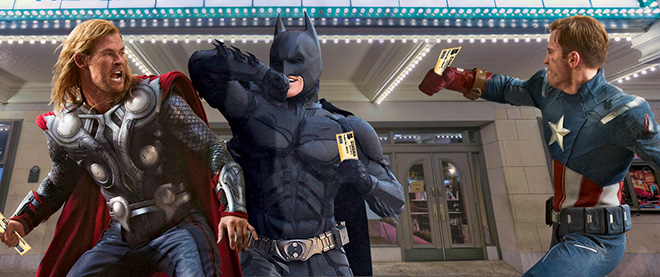The battle for box-office supremacy
Why are modern movie fans so obsessed with how films perform at the box office?
FAME Pictures/Keystone Press; iStock; Shutterstock; Marvel; Photo Illustration by Sarah Mackinnon
Share

It was the least important effect of the Colorado movie-theatre shooting: it left movie journalists without anything to write about for two days. Warner Brothers announced that “out of respect for the victims and their families,” it would hold off on reporting the box-office performance of The Dark Knight Rises until Sunday, and other studios also waited to announce how badly they were beaten by Christopher Nolan’s movie. Many publications were so lost without box-office numbers to report that they went underground, using what the Hollywood Reporter called “sources with access to numbers” to fill out their reports of Batman’s first two days in theatres. In today’s movie world, box office is so important that it’s practically the only thing worth talking about. Or as a leading showbiz gossip columnist, Deadline.com’s Nikki Finke, put it in a recent post: “Tragedy lowers grosses for all movies.”
Once upon a time, grosses for movies weren’t published much outside trade publications, and many studios were reluctant to publicize how much money their movies were making. But in recent years, movie box-office totals have become almost like sports scores, reported obsessively and pored over by statistical analysts at sites like Box Office Mojo. Many articles on The Dark Knight Rises focused on its box-office fight with this summer’s other comic-book movie, The Avengers, and once the opening weekend grosses were revealed, it inspired a flood of punny headlines like, “Dark Knight doesn’t quite rise to box-office challenge.” And it’s not just American movies that are getting this kind of scrutiny. In Open magazine last year, writer Anupama Chopra lamented that Indian movie coverage has become obsessed with “the 100-crore benchmark” and whether one Bollywood star can out-gross another.
But if movie journalists are preoccupied with box office, they might simply be following the lead of their readers, who frequently debate the potential grosses of their favourite films. A YouTube video was built around the battle of the Avengers and Batman for box-office supremacy, and Christopher Nolan’s admirers were rooting for him to surpass Avengers director Joss Whedon in the money race: “deep down, all of us Batman and Nolan fans want it to top The Avengers,” a fan wrote on NolanFans.com. That’s why Jeff Bock, a box-office data tracker, told AFP that the lack of opening-weekend figures for The Dark Knight Rises was a blow to movie buffs: “Taking this from the fans is sort of like reporting on the Super Bowl and not giving the final score.”
Some filmmakers and critics have worried that we’re starting to confuse a movie’s opening weekend gross with the quality or staying power of the film. Filmmaker Kevin Smith told his Twitter followers not to obsess over the box-office grosses of Scott Pilgrim vs. the World, the comic-book comedy set in Toronto: “The ONLY people who should be concerned at all with how much a movie makes are the people financially involved,” he wrote in exasperation. “You? Just enjoy (or don’t) the show.” Others point out that the opening weekend figures aren’t even as meaningful as studios and critics claim. In an analysis published after The Dark Knight Rises opened, Associated Press writer David Germain pointed out that until you adjust for inflation, grosses don’t necessarily tell you how popular a film is: “Hollywood perpetually breaks box-office records,” he wrote, “largely because ticket prices keep going up.”
Still, what Chopra called “our growing obsession with numbers” shows no sign of ending, and it may come to dominate more than it does now. Fans used to follow movies for their favourite stars, but this is an era where the star system is breaking down. With little-known actors headlining hits like The Amazing Spider-Man, Hollywood insiders have started arguing that stars are irrelevant: agent Gavin Polone wrote in New York magazine that “there is no such thing as a ‘star,’ ” and media mogul David Geffen told critics that “the story means more than the cast.” With fewer stars to talk about—unless they get divorced or cheat on each other—how the movie does at the box office might be the only thing worth talking about. Except, occasionally, the movie itself.